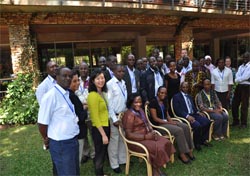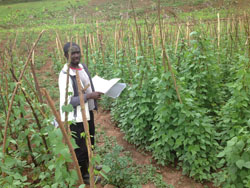A national planning workshop for the N2Africa project in Uganda was conducted from 27th to 30th January 2015 at Kabira Country Club in Kampala. The purpose of the workshop was twofold; to build a common understanding of the vision of the N2Africa project and the logic underpinning of the project action, and to develop a national work plan for the second year. The workshop brought together 35 participants that included dissemination partners (Africa 2000 Network, World Vision Uganda and VECO East Africa), National Agricultural Research Organization (NARO), CIAT, Makerere University and the private sector- Simlaw Seeds Limited, Equator Seeds Limited and Agrinet) and N2Africa project staff. The workshop began with two days of Theory of Change workshop led by the Agricultural Learning and Impacts Network (ALINe), followed by two days of Planning workshops led by N2Africa staff.
|
Group photo of workshop participants - Prof. Johnny Mugisha, seated 2nd from right |
Professor Johnny Mugisha, the Dean School of Agricultural Sciences, Makerere University, opened the workshop. He very much appreciated the structure and purpose of the workshop and the N2Africa project. He reiterated that intensification of cropping systems with legumes was a positive step in the right direction as legumes have a central role smallholder farming systems. He said that addressing nitrogen limitations would contribute to improved nutrition and food security and incomes thereby generally improving livelihoods of smallholder farmers. He noted that to deliver on the project goal partnerships were critical and thus urged participants to understand and fulfill their roles. He cited the key role of Makerere University in the partnership as offering training and production of rhizobium inoculants. |
He thanked IITA for support in refurbishing the rhizobiology laboratory for and establishing a greenhouse at Makerere Agricultural research Institute Kabanyolo. This would facilitate research and training and production of inoculants. However the marketing of the inoculants was poor and desired that a partnership that could enhance availability of inoculants to the farming communities was desirable, he said.
The purpose of the theory of the Theory of change workshop was to enable partners understand, own and agree on their roles in the M&E plan. The ALINe together team, Dr. Yvonne Pinto and Ms. Catherine You together with the N2Africa project M&E officer, Theresa Ampadu-Boakye facilitated the workshop and through it national partners appreciated the global N2Africa theory change in the country context country level. The participants coined a simplified version of the theory of change as N2Africa builds sustainable partnerships and expertise in nitrogen fixation to improve soil fertility, increase productivity, food security, nutrition and income through improved grain legumes for smallholder farmers. Underlying constraints for the theory of change in the Ugandan context were synthesised as:
- Poor legume productivity was characterised by lack of access to appropriate technologies, lack of knowledge, absence of effective extension and unpredictable weather and degraded soils;
- Poor diets and weak support to women and very poor farmers due to prefixed and rigid gender roles, less women inclusion and poor post harvest handling;
- Lack of effective legume input supply and output market chains due to limited markets for legumes, price fluctuations, high interest rates, taxation of agricultural inputs, lack of distribution systems for inoculants;
- Limited national capacity in legume agronomy and rhizobiology research as such: there is a paucity of knowledge and information, lack of appropriate rhizobium inoculants formulations for common bean and groundnut, conflicting agronomic and technological recommendations, limited research in rhizobiology and involvement of farmers in the research process.
On the basis of these issues key actors in the theory of change were identified and roles defined in the actor network for the relevant partnership developed.
The workshop transitioned to planning in the following two days 29th and 30th January 2015. This started with progress review for 2014. This was largely on N2Africa led dissemination in the three regions of operation (details will be found in a workshop report that will be ready and posted on the website soon).
| Much of the work in 2014 concentrated on demonstrations, diagnostic trials and adaptation trials reaching nearly three thousand farmers. Master plans (dissemination, agronomy, M&E, multi-stakeholder platforms, rhizobiology) guiding the implementation of the N2Africa project were discussed with the participants prior to development of action plans. Action plans were developed per grain legume commodity and involved partners from private sector (seed companies), research institutes, and dissemination partners who took the overall leadership. These action plans are being reviewed for formalization of agreements. However following the meeting steps are underway to concretize the partnerships. |
Amos, A2N field Assistant collecting data from a diagnostic trial at Kasyambya Kabale, 2014B |
One notable partnership on soyabean is led by World vision includes a buyer (Agrinet) and, Local seed business development (IISD), Equator Seed Company (Seed trader), Makerere University (inoculants and foundation seed for soyabean) NARO- NARL (Research), and Uganda Cooperative Alliance (farmer institutional strengthening). In this partnership, Agrinet has placed an order of 300,000 tons for MAKSOY2N soyabean variety. Agrinet has already discussed with farming communities organized by World vision in Apac, Oyam, Kole and set buying price of soyabean at harvest. They also commit to training farmers on post harvest handling (quality issues and establishing the bulking/buying centers). Farmers are now being mobilized for production and arrangements made for accessing quality seed from Equator Seed Company.
Peter Ebanyat and Connetie Ayesiga


